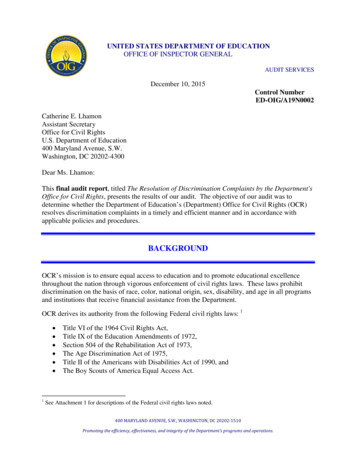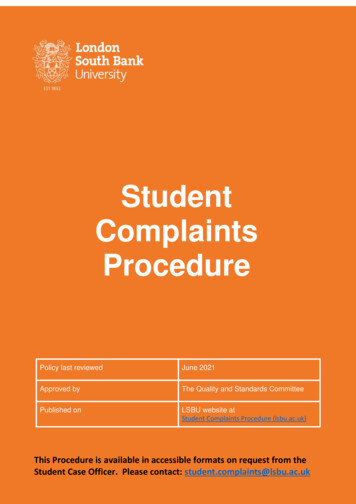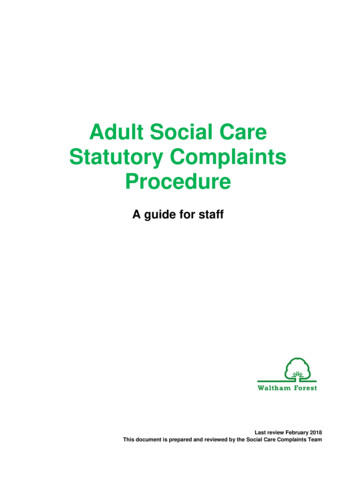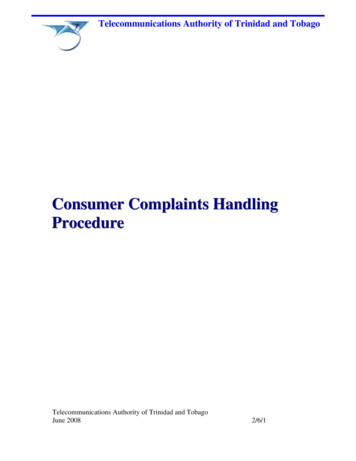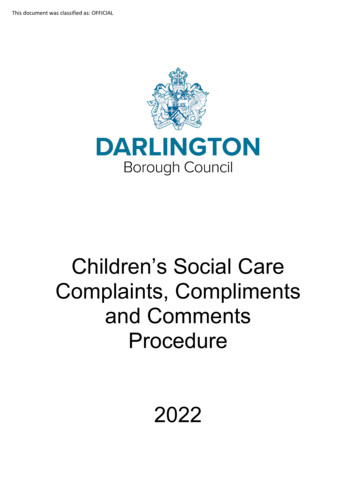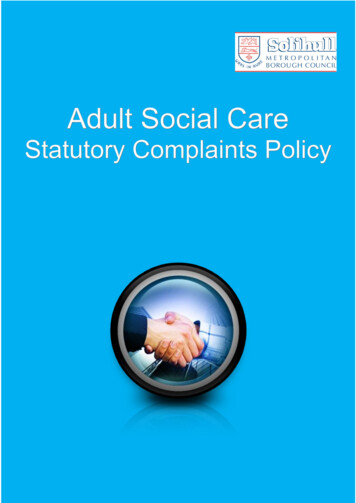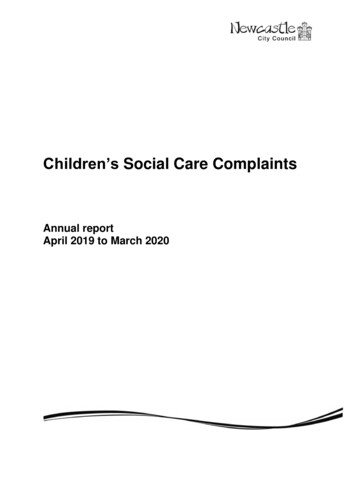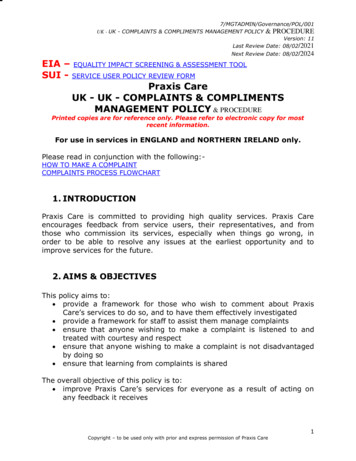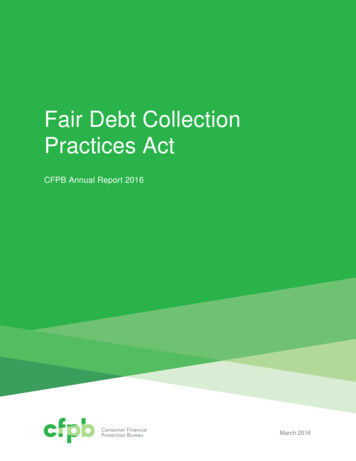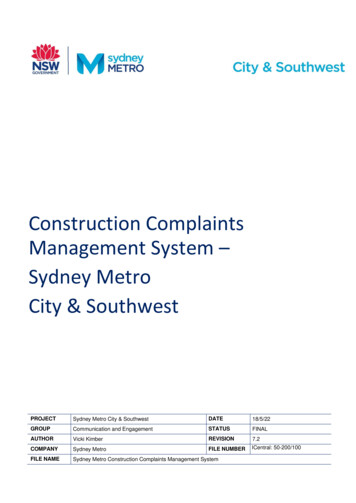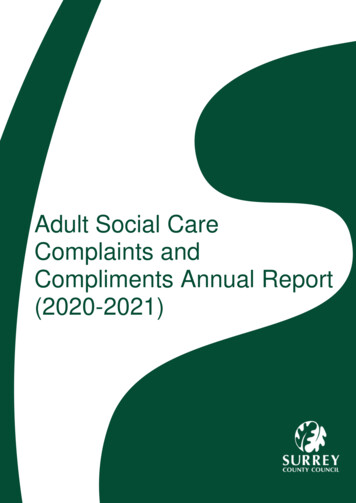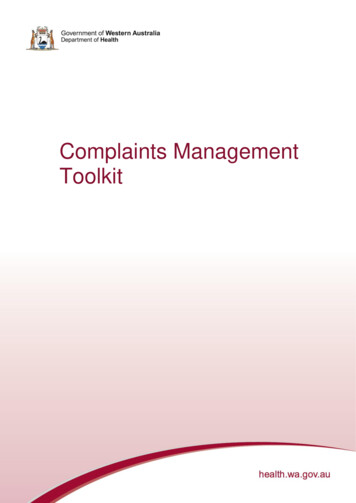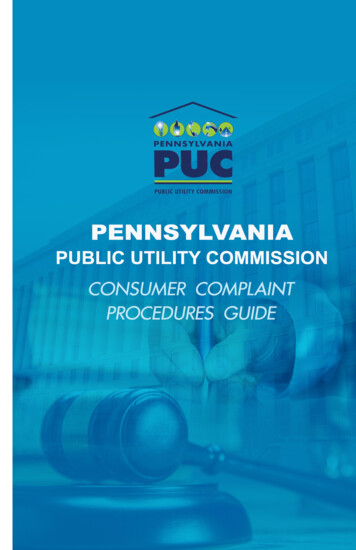
Transcription
CONTENTSFiling a Complaint.2Informal Complaint – Electric, Natural Gas, Telephone &Water/Wastewater.2Informal Complaint – Transportation.3Appeals of Informal Complaints – Electric, Natural Gas,Telephone & Water/Wastewater.4Appeals of Informal Complaints – Transportation.5Formal Complaint.5Formal Complaint To Proposed Rate Increase.8Mediation.9Procedure after Filing a Formal Complaint.9Answers and New Matter.10Preliminary Objections and Motions.11Hearings.11Decisions.14Helpful Resources.18Contact Information.19Disclaimer.201
FILING A COMPLAINTIf you have a problem or concern with a public utility, you can file acomplaint with the PUC. There are two kinds of complaints: an InformalComplaint and a Formal Complaint. Before you file a complaint with thePUC, you should contact the utility or company first to give it a chance tofix or address the problem. For some kinds of problems, such as billingand service issues about electric, natural gas, telephone and water/wastewater, you must contact the utility first before you file an Informalor Formal Complaint.INFORMAL COMPLAINT – ELECTRIC, NATURAL GAS,TELEPHONE & WATER/WASTEWATERFor problems with your electric, natural gas, telephone or water/wastewater service, you can file an Informal Complaint through thePUC’s Bureau of Consumer Services (BCS). After you file the InformalComplaint, a BCS representative will work with you and the companyto resolve the problem. This is easier and faster than filing a FormalComplaint.You can file an Informal Complaint about problems with a utility (such asbilling or service) by: Using the Informal Complaint form available on the PUC websiteat www.puc.pa.gov Calling BCS toll free at 1-800-692-7380 Sending an Informal Complaint by mail to BCS at:Bureau of Consumer ServicesPA Public Utility Commission400 North StreetHarrisburg, PA 17120In the Informal Complaint, you will have to tell us about your problem.After receiving an Informal Complaint, a BCS representative will look atthe information you provided and the facts about your case. The BCSrepresentative will also get in touch with the company to give it a chanceto respond to your concerns. BCS will then tell you and the companywhat BCS thinks about the problem. This is called the BCS decision andit will be given to you by letter, and sometimes also by phone.2
Informal Complaints about your electric, natural gas, telephone andwater/wastewater service are private, which means that the informationprovided stays between you, the company (including its lawyers andemployees), and the PUC. Other people will not see your InformalComplaint.INFORMAL COMPLAINT – TRANSPORTATIONInformal Complaints about companies or people that provide certaintransportation services, called “common or motor carriers” (such astaxicabs, limousines, household moving companies, trucking companies,transportation network companies or paratransit companies) should befiled with the PUC’s Bureau of Investigation and Enforcement (I&E). Forthese kinds of transportation complaints, you should use the “MotorCarrier Complaint Form” that we tell you about below.You may file an Informal Complaint about transportation problems by: Using the Motor Carrier Complaint form available on thewebsite at www.puc.pa.gov Calling I&E toll free at 1-800-692-7380 Sending an Informal Complaint by mail to I&E at:Bureau of Investigation & EnforcementPA Public Utility Commission400 North StreetHarrisburg, PA 17120For taxicab service problems, you can also file anInformal Complaint online through the websiteat www.puc.pa.gov.After you file an Informal Complaint, I&E willassign an enforcement officer to get informationfrom you and the company. I&E will review yourconcerns and the facts about your case. I&E willalso contact the company to give it a chance toprovide its response to your concerns. I&E willthen tell you and the company of its decision byletter. Also, if I&E determines that the motorcarrier violated the law or PUC regulations, I&Emay file its own Informal or Formal Complaintagainst the motor carrier.3
Informal Complaints about motor carriers are private, which means thatthe information provided stays between you, the company (including itsemployees and lawyers) and the PUC. Other people will not see yourInformal Complaint.NOTE: Do not contact the PUC about any problem you have with aPhiladelphia taxicab or limousine company. The Philadelphia ParkingAuthority (PPA) is the agency that is responsible for reviewing thoseproblems. If you have a concern with a Philadelphia taxicab orlimousine company you must contact the PPA at www.philapark.org or1-888-591-3636.APPEALS OF INFORMAL COMPLAINTS – ELECTRIC, NATURALGAS, TELEPHONE & WATER/WASTEWATERIf you do not agree with BCS’s decision about your Informal Complaint,you may ask the PUC to take a closer look at your case by filing a FormalComplaint. This is the way to “appeal your BCS decision.”When you get the BCS decision about your problem in the mail, therealso will be a form called a “Notification of Intent to Appeal.” If youwould like to appeal, be sure to send the form to the Secretary of thePUC at the address listed on the form. You must return your formno later than 20 days after the date in the form. A Notification ofIntent to Appeal cannot be faxed or e-mailed, but should be sent byovernight delivery, certified, or priority mail, to make sure it gets to uson time. After you send your Notification of Intent to Appeal form tothe Secretary, the Secretary will send you a Formal Complaint form tocomplete. You must return the Formal Complaint form to the Secretaryof the Commission no later than 30 days after the date of the Secretary’sletter.Sending the Notice of Intent Form on time is really important. Ifyour case is about setting up a payment arrangement to pay a billyou have already received, the PUC usually can establish only onepayment arrangement for you. If the BCS decision includes a paymentarrangement – and you do not file an appeal of the BCS decision –you must make all of the payments required by the BCS decision.Otherwise, the company has the right to shut off your service forfailure to pay your bills. Do not mail your payments to the PUC. Sendyour payments directly to your company.4
An appeal of your BCS decision does not mean you will get a lowerpayment arrangement. Any payment arrangement included in a BCSInformal Complaint decision is based on your income. The incomeguidelines are set by State and Federal laws. The PUC will take a closelook at the case to see if the law has been followed or if there is areason to change what the BCS decides. Because the law limits theamount and number of payment arrangements the PUC can order, acustomer is often better off trying to work out a payment arrangementwith the company because the company has more flexibility in settingup payment arrangements.APPEALS OF INFORMAL COMPLAINTS –TRANSPORTATIONRemember, the Office that handles transportation Informal Complaintsis called the Bureau of Investigation and Enforcement, or “I&E.” If youdo not agree with I&E’s decision about your Informal Complaint on atransportation problem, you can file a Formal Complaint with the PUC.FORMAL COMPLAINTFiling a Formal Complaint means sending a written Formal Complaintform to the PUC. It begins the process to get your problem addressedand usually takes six to nine months. It may involve a hearing that is likea trial before either an Administrative Law Judge (ALJ) or a Special Agentassigned to your case. Formal Complaints can be filed at any time withthe Secretary of the PUC. You do not need to go through the InformalComplaint process first.You may download a Formal Complaint form from the PUC websiteat www.puc.pa.gov or you can request that one be mailed to you bycalling the PUC toll free at 1-800-692-7380.You may file a Formal Complaint about problems with a utility (such asbilling or service) by mailing a Formal Complaint form to the Secretary’sBureau at:Secretary’s BureauPA Public Utility Commission400 North StreetHarrisburg, PA 171205
eFilingFormal Complaints also can be filed by using the PUC’s free electronicfiling system (eFiling) found on our website. eFiling is the PUC’s systemthat receives and stores documents in electronic form. It allows you tocreate an account and to deliver or “serve” documents on other partieselectronically rather than by mail. You can download the Quick UserGuide to eFiling at www.puc.pa.gov for step-by-step instructions.NOTE: eFiling does not mean filing by e-mail. We do not accept faxesand e-mailed filings of Formal Complaints.There are some times when you cannot use eFiling. For example, youcannot eFile a Formal Complaint when appealing a BCS decision. Also, ifyou want information in your Formal Complaint to be kept private, youshould not eFile the Complaint. Right now, the eFiling system cannotkeep things private. So anyone can see the things that are e-filed.6
Legal HelpYou are not required to have a lawyer if you are the customer orperson with the problem involving a utility. Individuals may representthemselves in the PUC Complaint process. If you do not have a lawyer,you will be called a “pro se” Complainant in PUC documents. Pro se justmeans you are handling the case for yourself.Businesses do not need an attorney to file a Formal Complaint. But,corporations, associations, partnerships, limited liability companies andpolitical subdivisions must have a lawyer with them at a hearing and tofile any motions, answers, briefs or other legal papers.7
FORMAL COMPLAINT TO PROPOSED RATE INCREASEIf your utility is planning to increase your rates, you can file a FormalComplaint. To file a Formal Complaint about the rate increase, use thePUC’s “Formal Complaint to a Proposed Rate Increase” Form found onthe PUC website at www.puc.pa.gov. You can also ask that the formbe mailed to you by calling the PUC toll free at 1-800-692-7380. Filethe Formal Complaint to a Proposed Rate Increase by either eFiling ormailing the form to the Secretary’s Bureau at:Secretary’s BureauPA Public Utility Commission400 North StreetHarrisburg, PA 17120You can find more abouteFiling on Page 6 underFormal Complaints oron the PUC website atwww.puc.pa.gov.Filing the Formal Complaintto a Proposed RateIncrease Form will makeyou a “party” to the case.Being a party means youmay show up for any hearings held regarding this matter in front of anAdministrative Law Judge (ALJ). At the hearing you can tell the judgewhy you think the company’s rates should not increase.If you do not want to be a party to the case, you can fill out and sendus a form telling us what you think about the higher rates the companywants to charge you. These are called “Comments.” To send Commentsuse the “Comment to Proposed Rate Increase” Form on the PUC websiteat www.puc.pa.gov or ask that the form be mailed to you by calling thePUC toll free at 1-800-692-7380.A Public Input Hearing is a hearing that is open to the public. If a PublicInput Hearing is held in your area, you, and other people will have achance to tell the PUC in person what you think of the higher rates thecompany wants to charge or anything else the company is asking for inthat case. Also, you can ask questions about whether the company isgiving you good service or if there are other problems with the serviceyou get.8
You can file Comments to a Proposed Rate Increase by either eFiling ormailing the form to the Secretary’s Bureau at:Secretary’s BureauPA Public Utility Commission400 North StreetHarrisburg, PA 17120MEDIATIONYou can ask for mediation after filing a Formal Complaint. Mediationis a more flexible program that is meant to help parties resolve theirproblems after the filing of a Formal Complaint without the need for ahearing. You decide if you want to use Mediation.If you wish to use mediation, the Office of Administrative Law Judge(OALJ) assigns a mediator who is a neutral PUC staff member to overseethe talks between you and the company. The mediator does not takesides or make a decision. Instead, the mediator will help you and thecompany work out the problem and reach a solution that you can agreeon. Mediation may lower the costs of working out the problem andcan also save time. More information about Mediation is on the PUCwebsite at www.puc.pa.gov or by calling the OALJ at 717-787-1191.PROCEDURE AFTER FILING A FORMAL COMPLAINTThe PUC will send the company a copy of your Formal Complaint afterit is filed with the PUC. The company will have a chance to Answeryour Formal Complaint, which is explained below in the next section.Someone with the company may contact you about helping to fix yourproblem.Once you file a Formal Complaint, it is very important to watch your mailfor anything from either the PUC or the company. These documentsmay contain instructions or other information that could affect theoutcome of your case. A number called a “docket number” also will beassigned to your case. It is important to include this docket number onanything you send to the PUC. If you write the wrong docket number ona filing or letter, it can cause problems with your case.9
If you and the company have agreed to work out your Formal Complaint,the company will let the PUC know. This is called a “settlement.” Thecompany will let us know about the settlement by sending a noticecalled a “Certificate of Satisfaction.” A Certificate of Satisfaction meansyou agree that the problem has been fixed and that you want to endyour Formal Complaint against the company.If you move and change your address or get a different telephonenumber, you must notify the Secretary’s Bureau of the PUC of yournew address or telephone number. It is your responsibility to notifythe PUC of any changes to your address or telephone number. Youmust give us any changes to your address or telephone number whileyour case is before the PUC. If you do not let the PUC know aboutchanges to your address or telephone number, you may not getimportant information and notices. This might cause you to lose yourcase.ANSWERS AND NEW MATTERThe company will have a chance to tell us what it thinks about yourFormal Complaint. This is called an “Answer.” You should receive anAnswer from the company within 20 days after the company receivedyour Formal Complaint. Answers will either admit or deny the claimsyou made in your Complaint. You do not need to reply to the company’sAnswer unless a “New Matter” is filed.Sometimes Answers contain a part called “New Matter.” In New Matter,the company is stating what it thinks is a fact or a defense that is morethan just saying “no” to your Complaint. New Matter raises facts andarguments from the company’s point of view other than what you haveset forth in your Formal Complaint. You have the right to tell us whatyou think about the New Matter in writing no later than 20 days of thedate the New Matter is served.If you do not respond to the New Matter, the PUC can accept thecompany’s information as a fact, and can make a decision in your casewithout the need for a hearing. Information about Answers and NewMatter is located in the PUC’s Regulations at 52 Pa. Code §§ 5.61 to5.63. You can find information about serving these documents in thePUC’s Regulations at 52 Pa. Code §§ 1.54 to 1.56.10
PRELIMINARY OBJECTIONS AND MOTIONSPreliminary Objections (POs) are when someone thinks the person filinga Formal Complaint does not have a right to bring the matter before thePUC. POs can be raised for one of seven reasons, but often because thePUC does not have the right to address your complaint. If the companyfiles POs, you usually have 10 days to answer the POs in writing. In youranswer to the POs, you must say why you think the PUC can try to solveyour problem. If Preliminary Objections are granted, you may lose all orpart of your case without having a hearing.Once the time to answer any POs or New Matter has passed, a Party canfile the following motions: Motions for Judgment on the Pleadings, which are requests thatthe PUC dismiss the case without a hearing. In this motion, theparty filing it believes there is no way, even if all the facts aretrue, that the other party can win. Motions for Summary Judgment, which are requests for the PUCto make a decision without a hearing. In this motion, the partyfiling it believes there are no facts that need to be decided, butthat the PUC only needs to apply the facts to the law.If the company files either a Motion for Judgment on the Pleadings or aMotion for Summary Judgment, you usually have 20 days to respond inwriting. If the motion is granted, you may lose all or part of your casewithout having a hearing. Information about these Motions and thetime for responding is located in the PUC’s Regulations at 52 Pa. Code§§ 5.101 and 5.102. Also, you can find information about serving theseMotions in the PUC’s Regulations at 52 Pa. Code §§ 1.54 and 1.56.HEARINGSA hearing is held before a Presiding Officer (either an ALJ or a SpecialAgent). A hearing looks a lot like a trial but there is no jury. ThePresiding Officer will schedule a hearing, and you must be present togive testimony and provide proof about your case. There is usually onlyone hearing called an “Initial Hearing,” but another hearing or hearingsmay be held if necessary.The Initial Hearing is usually the only chance you will get to prove whatyou say in your Formal Complaint is true. If you do not show up forthe Initial Hearing (or if you cannot give a good reason why you will11
be unable to attend), you may lose your case. You may also lose thechance to seek any help from the PUC to resolve your problem with thecompany if you do not show up for the hearing.Preparing for the HearingThe PUC will send you a Hearing Notice and a Prehearing Order priorto the hearing. This information will let you know the date, time, andplace of your hearing. Carefully read both documents because they willcontain important instructions about your case and the hearing.Hearings are held in person or by telephone. You may ask for an inperson or a telephone hearing, but the final decision will be up tothe Presiding Officer. You should make a request for an in-person ortelephone hearing as soon as possible. This request can be included onthe Formal Complaint form.For telephone hearings,the PUC must be able toreach you at the exacttime listed for yourhearing. If the PresidingOfficer has given you atoll-free conference callnumber, you must callthat number at the timelisted on the HearingNotice. If you do not callthe number at the timelisted on the Hearing Notice, your case may be dismissed. For in-personhearings, you or your attorney must show up or your case may bedismissed.If, for a good reason, you will not be able to make the hearing orcannot call at the time listed on the hearing notice, you can ask fora change in the hearing date. This is called a “continuance.” To askfor a continuance, you should write to the Presiding Officer and thecompany no later than five days before the hearing. You can findmore information about continuances in the Prehearing Order that thePresiding Officer will send to you.12
Hearing ProcedureDuring the hearing, you will need to explain why your Formal Complaintshould be granted. The more documents you can bring in support ofyour case, the better. These documents could include letters, bills,cancelled checks, receipts, leases and account statements from theutility. These documents are called “Exhibits” and need to be made partof the official record in the case. Usually, you will need to send copies ofyour Exhibits to the Presiding Officer and the company’s lawyer beforethe date of the hearing. You can find information on making exhibitspart of the record and for sending copies of Exhibits in the PrehearingOrder sent to you by the Presiding Officer.The PUC prefers for parties to agree to end their cases through“settlement.” A settlement is when you and the company agree on away to fix your problem without a hearing. Before the hearing begins,the Presiding Officer will give you and the company private time todiscuss a possible settlement of the case.If your Formal Complaint does not settle and the hearing takes place,you will be asked to testify and give written documents or exhibits tosupport your case. These statements will be typed into a documentcalled a “transcript.”As the person filing a Complaint, you will go first, because you have the“burden of proof.” This means you are required to prove your case.When you are finished giving the facts about your case, the company’slawyer will then be allowed to ask you questions, which is called “crossexamination.” The company lawyer will usually put some witnesses onthe stand. When the lawyer is finished asking questions, you will beallowed to ask follow-up questions of the company’s witnesses.During the hearing, you or the utility might think there is a problemwith what a witness is saying or with what an exhibit shows. In thatsituation, a party may make an objection and tell the Presiding Officerwhy it objects to the statement or the exhibit. If an objection is granted,the things objected to will not be considered by the PUC when makinga decision on the Formal Complaint. You must give a reason or statea basis for any objection you make. If necessary, the Presiding Officermay explain the objection, and allow the other party to respond. ThePresiding Officer will then decide, at the hearing or in the decision, ifthe objected-to testimony or exhibits can be considered in making adecision on the Formal Complaint.13
Contacting the CommissionUsually, you cannot talk to the Presiding Officer about your case without the other party being present or it may be considered an “ex parte”communication. Without the other party present, you may only speakto the Presiding Officer about scheduling issues. You cannot talk withthe presiding officer about the facts of your case without the otherparty present to represent its interests. To avoid any prohibited ex partecommunications - it is recommended that you contact the Legal Divisionof the OALJ at 717-787-1191 if you have any questions about the FormalComplaint process.DECISIONSInitial DecisionAfter the hearing, the Presiding Officer will make a decision about thecase. The Presiding Officer’s decision is called an “Initial Decision.” TheInitial Decision will determine if a Formal Complaint has been successfulor whether the Formal Complaint should be dismissed. If successful,the Initial Decision will say that the Formal Complaint is “sustained.” Itwill be based on the documents presented and what is said during thehearing. It also will be based on the law and how the PUC has ruled onsimilar cases previously.The Initial Decision is often the PUC’s final action about your FormalComplaint. But, if Exceptions are filed, the PUC will review the InitialDecision. Parties have a right to file Exceptions. These are writtenobjections to the Initial Decision and are described in more detail below.After Exceptions are filed and any Reply to Exceptions are received, thePUC Commissioners will make a final decision at a Public Meeting. Thisis a meeting that anyone can attend. During the Public Meeting theCommissioners will vote on your Formal Complaint and any other casesbefore the PUC. You do not have to attend the Public Meeting. But ifyou do attend, you cannot speak during the Public Meeting becauseyou already had the chance to explain your problem during the FormalComplaint process.14
Recommended DecisionIn some cases, such as when a company wants to charge higher ratesfor customers, the Presiding Officer will write a decision known asa “Recommended Decision.” The Commissioners will make a finaldecision about Recommended Decisions at a Public Meeting.ExceptionsIf you disagree with any part of what was decided in the Initial orRecommended Decision, you can object to the decision in writing byfiling Exceptions with the PUC.The Secretary’s Bureau at the PUC will send you a letter which enclosesthe Initial or Recommended Decision. In the letter, the Secretary’sBureau will tell you the date when Exceptions must be filed. Usually,Exceptions must be received by the Secretary’s Bureau no later than 20days after the date of the Secretary’s letter. You must also send or mail acopy of your Exceptions to the utility’s attorney at the address providedby the PUC. If you need extra time to file Exceptions, you must contactthe PUC’s Office of Special Assistants at 717-787-1827.15
The Exceptions should explain the reasons why you disagree with theInitial or Recommended Decision. You will need to explain your reasonsusing the facts, witness statements and exhibits from the hearing. But,you cannot bring up new facts, such as new testimony or documents,which were not discussed at the hearing. When writing your Exceptions,it may be helpful to read the transcript of the hearing. For informationabout looking at the transcript, call the Secretary’s Bureau at717-772-7777.The company will have a chance to file a written response to yourExceptions, called a Reply to Exceptions. Also, if the company disagreeswith the decision and files Exceptions, you will have the chance to filea Reply to Exceptions. A Reply to Exceptions is usually due no laterthan 10 days after Exceptions are due. You can find information aboutExceptions and Reply to Exceptions in the PUC’s Regulations at 52 Pa.Code §§ 5.533 to 5.536.Final OrderAfter Exceptions are filed, the PUC Commissioners will review thePresiding Officer’s decision, the Exceptions and any Reply to Exceptions.Usually, no additional hearings are held. Afterwards, the Commissionerswill vote on the case at a Public Meeting. The Commission’s decision is afinal order.The Commissioners may agree with the Initial Decision orRecommended Decision and adopt the Presiding Officer’s decision. Or,the Commissioners may change the Initial Decision or RecommendedDecision. Also, the Commissioners may only agree with some parts ofthe Initial Decision or Recommended Decision and change other partsof the decision by making a Motion at the Public Meeting. Sometimes,the Commissioners may send the case back to the Presiding Officerfor more hearings and another decision. This is called a remand. TheCommissioners will explain their reasons for modifying the presidingofficer’s decision or remanding the case in a document called an Opinionand Order.16
Review of a Final OrderIf you do not agree with the PUC’s Opinion and Order about your FormalComplaint, you can ask for another review. These are known by thelegal terms of rehearing, reconsideration, clarification, or rescission.Depending on the type of help you are asking for, you must file apetition with the PUC within the time required by the PUC’s Regulations.Usually, petitions for reconsideration must be filed no later than 15days after the “Order Entered” date on the last page of the Opinion andOrder. Information about filing petitions for relief is located in the PUC’sRegulations at 52 Pa. Code §§ 5.571 and 5.572.Commonwealth CourtYou, or any other party, may file an appeal of the Opinion and Orderwith the Commonwealth Court of Pennsylvania no later than 30 daysafter the Order Entered date on the last page of the Opinion andOrder. You can find information about filing an appeal of a final PUCorder on the Commonwealth Court’s website at www.pacourts.us/courts/commonwealth-court/ or you can call the Clerk’s Office at717-255-1650.17
HELPFUL RESOURCES www.puc.pa.gov - PUC WebsiteoResponsible Utility Customer Protection Act Factsheets- explains the changes to the rules that apply tocash deposits; reconnection of service; terminationof service; payment arrangements and the filing oftermination complaints by electric, gas and waterconsumers. Public Utility Code of Laws (also called “statutes”) PUC Rules and Regulations www.oca.state.pa.us or 1-800-684-6560 - Pennsylvania Office ofConsumer AdvocateoWhat’s up with that? Your friendly guide tounderstanding PUC procedureoWhere can I find it? Your friendly index to PUCprocedural rulesoResponsible Utility Customer Protection Act: Yourfriendly guide to understanding Chapter 14 of the PublicUtility Code18
CONTACT INFORMATION 1-800-692-7380 (Consumer Hotline)oInformal Complaint Information for Electric, Gas, Water,Wastewater or Telephone/Telecommunications issues:Bureau of Consumer ServicesoInformal Complaint Information for Transportationor Motor Carrier issues: Bureau of Investigation andEnforcement717-772-7777 (Secretary’s Bureau)o 717-787-1191 (Office of Administrative Law Judge)oo Hearing InformationOffice of Administrative Law Judge Mediation717-787-1827 (Office of Special Assistants)o Formal Complaint InformationExtensions for Exceptions and Reply to Exceptions1-800-322-7572oLegal Assista
PUC at the address listed on the form. You must return your form no later than 20 days after the date in the form. A Notification of Intent to Appeal cannot be faxed or e-mailed, but should be sent by overnight delivery, certified, or priority mail, to make sure it gets to us on time. After you send your Notification of Intent to Appeal form to
